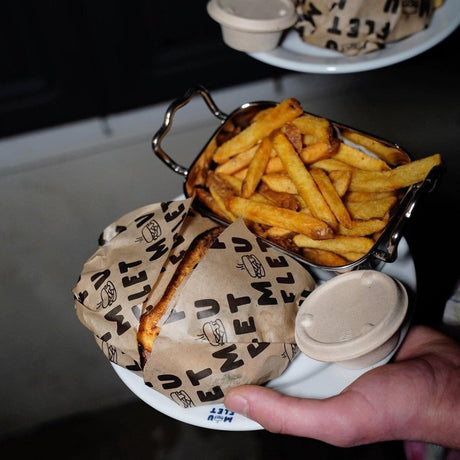PFAS is a growing concern in the world of food packaging. As more restaurants and consumers turn to eco-friendly alternatives like compostable packaging, understanding what PFAS is and why it matters is essential. At Made Not To Last, we are committed to a cleaner future by phasing out PFAS from our takeaway packaging materials.
What is PFAS?
PFAS stands for per and polyfluoroalkyl substances. These are synthetic chemicals used to make materials resistant to water, grease and heat. PFAS has been used for decades in various industries, including non-stick cookware, waterproof clothing, and more recently, takeaway food packaging.
In packaging, PFAS helps prevent food and oils from soaking through containers. However, while they may add short-term convenience, PFAS are known as “forever chemicals” because they do not break down in the environment. This has raised major concerns about their long-term impact on both human health and ecosystems.
Where is PFAS Found in Takeaway Packaging?
PFAS is often found in paper-based food containers, compostable packaging, and even moulded fibre products like bagasse. Bagasse is a popular sustainable material made from sugarcane pulp and widely used as an alternative to plastic. While bagasse is naturally compostable, some manufacturers apply PFAS coatings to make it more water or grease-resistant.
This means that not all compostable packaging is created equal. A product labelled compostable may still contain PFAS unless it is explicitly certified PFAS free.
Why is PFAS a Problem?
PFAS has been linked to a number of health and environmental issues. Research suggests it may affect hormone levels, immune response and even increase the risk of certain cancers. In the environment, PFAS can contaminate soil and water, persisting for generations without breaking down.
For restaurants, using packaging that contains PFAS can result in contaminated compost, undermining sustainability efforts and potentially violating new environmental regulations.
Phasing Out PFAS: The Made Not To Last Approach
At Made Not To Last, we believe in packaging that is made to serve a purpose — and then safely return to the earth. That’s why we are actively removing PFAS from our entire product line. We offer certified compostable, PFAS free packaging that meets the highest environmental and food safety standards.
Our bagasse containers, cups and trays are tested and verified to be free from harmful chemical coatings, ensuring they break down naturally and can be disposed of with food waste through composting services.
What Should Restaurants Look For?
If your business is looking to switch to safer, more sustainable packaging, look for products that are clearly labelled PFAS free and meet certifications such as EN13432 or ASTM D6400. Ask your supplier for transparency on coatings and treatments, especially when purchasing moulded fibre or bagasse items.
Opt for packaging that aligns with the principles of a circular economy — packaging that is designed not to last forever, but to return safely to nature as compost or renewable energy through food waste recycling schemes.
The Future of PFAS-Free Food Packaging
As global awareness grows, many governments are beginning to regulate or ban the use of PFAS in food packaging. The UK market is seeing increased demand for safe, plastic-free, and chemical-free takeaway solutions.
At Made Not To Last, we are proud to be part of that movement. By offering high-quality, PFAS free takeaway packaging, we help restaurants meet environmental goals and give customers confidence that their food is served responsibly.
Conclusion
PFAS may have been a hidden ingredient in takeaway packaging for years, but that is changing. With safer alternatives like untreated bagasse and verified compostable materials, restaurants can now choose packaging that works for both their food and the planet. By choosing PFAS free products and working with suppliers committed to transparency, your business can take a meaningful step toward a cleaner, healthier future.

